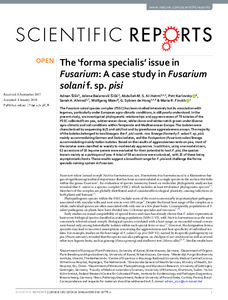Datum
2018-01-19Autor
Šišić, AdnanBaćanović-Šišić, JelenaAl-Hatmi, Abdullah M. S.Karlovsky, PetrAhmed, Sarah A.Maier, WolfgangHoog, G. Sybren deFinckh, Maria RenateSchlagwort
630 Landwirtschaft, VeterinärmedizinMetadata
Zur Langanzeige
Aufsatz
Artikel (Publikationen im Open Access gefördert durch die UB)

The ‘forma specialis’ issue in Fusarium: A case study in Fusarium solani f. sp. pisi
Zusammenfassung
The Fusarium solani species complex (FSSC) has been studied intensively but its association with legumes, particularly under European agro-climatic conditions, is still poorly understood. In the present study, we investigated phylogenetic relationships and aggressiveness of 79 isolates of the FSSC collected from pea, subterranean clover, white clover and winter vetch grown under diverse agro-climatic and soil conditions within Temperate and Mediterranean Europe. The isolates were characterized by sequencing tef1 and rpb2 loci and by greenhouse aggressiveness assays. The majority of the isolates belonged to two lineages: the F. pisi comb. nov. lineage (formerly F. solani f. sp. pisi) mainly accommodating German and Swiss isolates, and the Fusisporium (Fusarium) solani lineage accommodating mainly Italian isolates. Based on the results of aggressiveness tests on pea, most of the isolates were classified as weakly to moderately aggressive. In addition, using one model strain, 62 accessions of 10 legume genera were evaluated for their potential to host F. pisi, the species known mainly as a pathogen of pea. A total of 58 accessions were colonized, with 25 of these being asymptomatic hosts. These results suggest a broad host range for F. pisi and challenge the forma specialis naming system in Fusarium.
Zitierform
In: Scientific Reports. - London : Nature Publishing Group. - (2018) 8:1252Förderhinweis
Gefördert durch den Publikationsfonds der Universität KasselSammlung(en)
Publikationen (Fachgebiet Ökologischer Pflanzenschutz)Artikel (Publikationen im Open Access gefördert durch die UB)
Zitieren
@article{urn:nbn:de:hebis:34-2018020654503,
author={Šišić, Adnan and Baćanović-Šišić, Jelena and Al-Hatmi, Abdullah M. S. and Karlovsky, Petr and Ahmed, Sarah A. and Maier, Wolfgang and Hoog, G. Sybren de and Finckh, Maria Renate},
title={The ‘forma specialis’ issue in Fusarium: A case study in Fusarium solani f. sp. pisi},
year={2018}
}
0500 Oax 0501 Text $btxt$2rdacontent 0502 Computermedien $bc$2rdacarrier 1100 2018$n2018 1500 1/eng 2050 ##0##urn:nbn:de:hebis:34-2018020654503 3000 Šišić, Adnan 3010 Baćanović-Šišić, Jelena 3010 Al-Hatmi, Abdullah M. S. 3010 Karlovsky, Petr 3010 Ahmed, Sarah A. 3010 Maier, Wolfgang 3010 Hoog, G. Sybren de 3010 Finckh, Maria Renate 4000 The ‘forma specialis’ issue in Fusarium: A case study in Fusarium solani f. sp. pisi / Šišić, Adnan 4030 4060 Online-Ressource 4085 ##0##=u http://nbn-resolving.de/urn:nbn:de:hebis:34-2018020654503=x R 4204 \$dAufsatz 4170 7136 ##0##urn:nbn:de:hebis:34-2018020654503
<resource xsi:schemaLocation="http://datacite.org/schema/kernel-2.2 http://schema.datacite.org/meta/kernel-2.2/metadata.xsd"> 2018-02-06T14:57:22Z 2018-02-06T14:57:22Z 2018-01-19 2045-2322 urn:nbn:de:hebis:34-2018020654503 http://hdl.handle.net/123456789/2018020654503 Gefördert durch den Publikationsfonds der Universität Kassel eng Urheberrechtlich geschützt https://rightsstatements.org/page/InC/1.0/ Fungal biology Pathogens 630 The ‘forma specialis’ issue in Fusarium: A case study in Fusarium solani f. sp. pisi Aufsatz The Fusarium solani species complex (FSSC) has been studied intensively but its association with legumes, particularly under European agro-climatic conditions, is still poorly understood. In the present study, we investigated phylogenetic relationships and aggressiveness of 79 isolates of the FSSC collected from pea, subterranean clover, white clover and winter vetch grown under diverse agro-climatic and soil conditions within Temperate and Mediterranean Europe. The isolates were characterized by sequencing tef1 and rpb2 loci and by greenhouse aggressiveness assays. The majority of the isolates belonged to two lineages: the F. pisi comb. nov. lineage (formerly F. solani f. sp. pisi) mainly accommodating German and Swiss isolates, and the Fusisporium (Fusarium) solani lineage accommodating mainly Italian isolates. Based on the results of aggressiveness tests on pea, most of the isolates were classified as weakly to moderately aggressive. In addition, using one model strain, 62 accessions of 10 legume genera were evaluated for their potential to host F. pisi, the species known mainly as a pathogen of pea. A total of 58 accessions were colonized, with 25 of these being asymptomatic hosts. These results suggest a broad host range for F. pisi and challenge the forma specialis naming system in Fusarium. open access In: Scientific Reports. - London : Nature Publishing Group. - (2018) 8:1252 Šišić, Adnan Baćanović-Šišić, Jelena Al-Hatmi, Abdullah M. S. Karlovsky, Petr Ahmed, Sarah A. Maier, Wolfgang Hoog, G. Sybren de Finckh, Maria Renate doi:10.1038/s41598-018-19779-z </resource>
Die folgenden Lizenzbestimmungen sind mit dieser Ressource verbunden:
Urheberrechtlich geschützt

